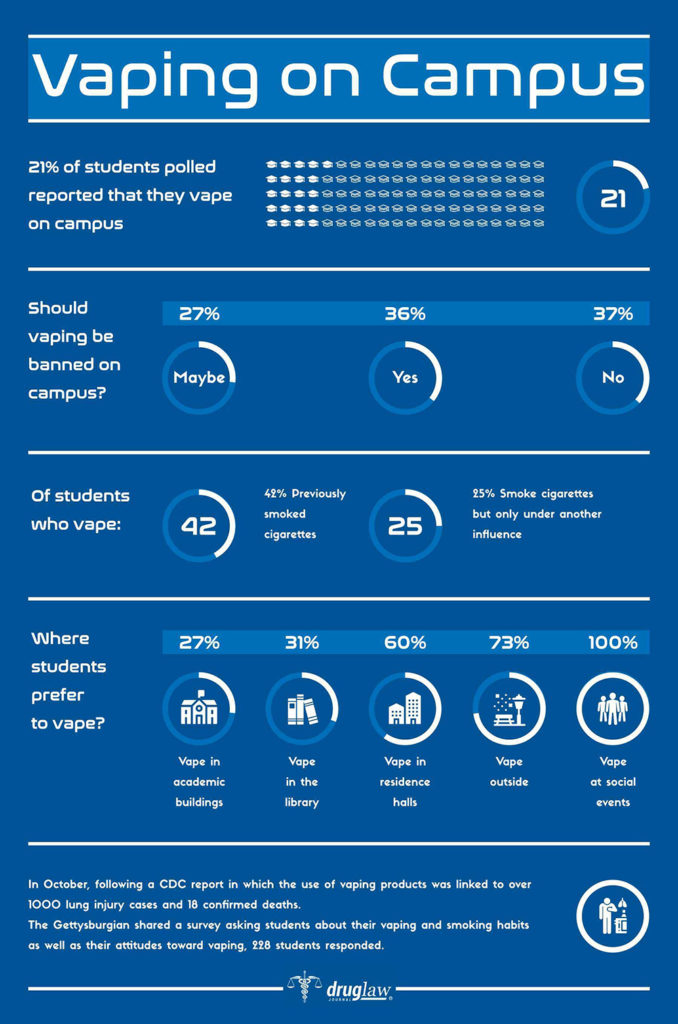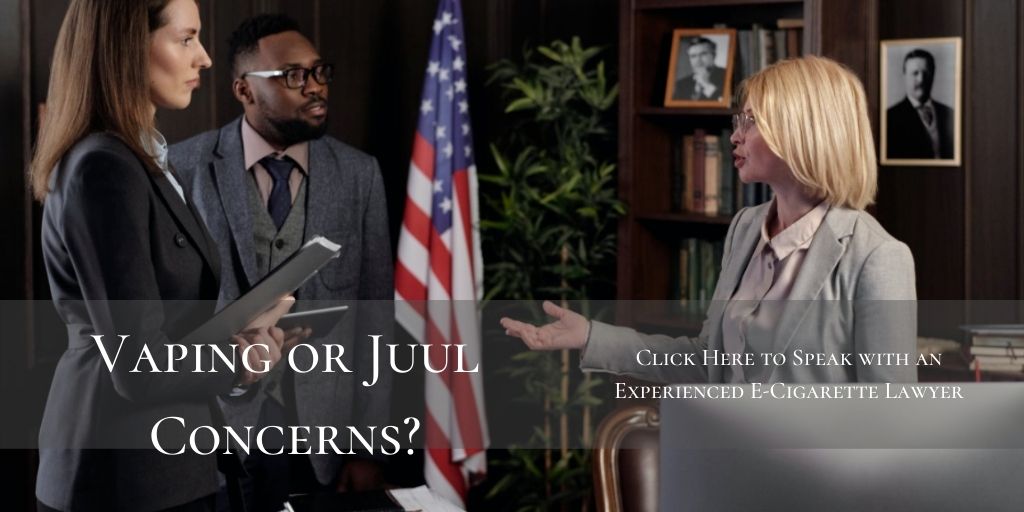Last Updated November 7, 2020
Adult use of combustible tobacco products, such as cigarettes has been on a continuous decline in the United States since the first Surgeon General’s report was released in 1964. In 2018, cigarette smoking among adults in the U.S. fell to 14%, the lowest on record for available data. However, this trend has been augmented by e-cigarettes, sometimes referred to as: e-cigs; vapes; e-hookas; vape pens; or by the brand name “Juul”; which entered the market in the U.S. around 2007. As of 2018, about 3.2% of American adults reported that they are regular e-cigarette users. Approximately half of adults who use e-cigarettes also smoke combustible tobacco – a behavior known as “dual-use”.
For many years, the use of e-cigarettes and vaping was touted (largely by manufacturers) as a safe alternative to smoking, and a useful tool to help with tobacco smoking cessation. While much remains to be learned about the long term health consequences of vaping, evolving research suggests that the increased exposure to nicotine, in combination with the aerosolized compounds released into the lungs by vaping, nonetheless present the potential for serious health consequences.
Because vaping is a much more sophisticated and efficient method for the delivery of nicotine, quitting can be quite a challenge for adults as well as teens. Nicotine addiction is a well-documented phenomenon as is nicotine withdrawal. Accordingly, if you are thinking about quitting your vaping habit – it helps to understand the effects of nicotine as well as have a plan for successfully countering nicotine withdrawal.
How Addictive Is Vaping?
E-cigarettes contain nicotine just like regular cigarettes. Research on nicotine suggests it may be as addictive as heroin and cocaine. Because of the vaporizing mechanism in e-cigarettes, users tend to receive much higher concentrations of nicotine than they would from an ordinary tobacco cigarette. Furthermore, users of e-cigarettes can even buy extra-strength nicotine cartridges or augment the voltage of the e-cigarette to increase the amount of nicotine.
Nicotine is dangerous for adults as well as teens. However, it presents particular problems for early brain development when it is used by teens. Adolescent brains tend to be more sensitive to “rewards” which trigger dopamine in younger brains. Dopamine is a well-understood neurotransmitter that gives the brain a “feel-good” feeling and encourages the brain to repeat actions that promote dopamine release. The more dopamine triggers in the brain, the more association with nicotine rewards become engrained. When addicted e-cigarette users, and in particular, teens, attempt to quit vaping, nicotine cravings become a huge problem in the absence of a consistent dopamine rush.
What Are the Potential Dangers?
Compared to regular cigarettes and the volumes of research that have emerged over several decades, e-cigarettes have only been on the market for a relatively short amount of time. Even so, doctors and scientists have been successfully accumulating copious research on e-cigarettes in an effort to understand more fully what their impact is on human health.
Nicotine Exposure
Even short-term exposure to nicotine has been demonstrated to include tremors and an increase in heart rate, blood pressure, and respiration. Nicotine is a teratogen meaning it can promote the growth of tumors. Furthermore, nicotine exposure for pregnant mothers and small children can have long term impacts on fetal brain development or even potentially lethal consequences if ingested.
BOOP
The American Thoracic Society (ATS) published an article on the prevalence of Bronchiolitis Obliterans Organizing Pneumonia (BOOP) in patients claiming they use e-cigarettes. BOOP is a rare inflammatory lung disorder involving flu-like symptoms and coughing that make breathing very difficult in sufferers.
EVALI
The Journal of the Missouri State Medical Association’s November 2019 edition gave an extensive look into the increasingly bleak outlook for Vaping Associated Lung Injury (EVALI) in the United States. The articles noted that as of its publication, there were 2,051 cases of e-cigarette or vaping lung product uses associated with lung injury (with 39 reported deaths) in the U.S. Overwhelmingly, EVALI patients complain of symptoms like cough, chest pain, and shortness of breath. Of the documented cases expressing EVALI, 86% of the patients reported using THC-containing products. In February 2019, the New England Journal of Medicine and the Centers for Disease Control (CDC) had both established research pieces linking Vitamin E Acetate, a thickening fluid used predominantly in THC vaping products with EVALI.
How Difficult Is It to Quit Vaping?
Again, due to the short amount of time most e-cigarette products have been on the market, hard data on vaping and quitting is mostly still emerging. However, the American Lung Association has noted that it is observing people having a greater difficulty trying to quit vaping than they did with combustible cigarettes. E-cigarette users tend to inhale more deeply and hold the vapor for longer periods of time than ordinary tobacco smoke. Accordingly, they tend to dose the brain with substantially more nicotine, more frequently throughout the day. Consequently, the symptoms and effects of nicotine withdrawal on e-cigarette users may even be more profound than they are on ordinary tobacco smokers.
While the U.S. Food and Drug Administration (FDA) has approved nicotine patches, gum and lozenges to help quit combustible tobacco use, no similar method has been approved to assist vapers with quitting.

What Are Some Methods for Quitting Vaping?
Because nicotine is addictive, the human brain and body become conditioned to its presence. For most users of nicotine, removal of nicotine from their bodily systems will come with some immediate side effects. For e-cigarette users serious about quitting, it helps to first reconcile all of the reasons why you should quit – and then have a plan for how you are going to address and cope with some of the side-effects of kicking the nicotine habit.
Step One – Tell Yourself Why You Want to Quit
Determining why you want to quit using nicotine is usually a good place to start on the path to successfully kick the habit. Perhaps you are concerned with the litany of potential ill-health effects connected with vaping. Maybe you’re thinking that if you quit, you’ll save a lot of money or help protect loved ones from second-hand exposure to nicotine. There is no wrong reason to quit.
Step Two – Understand the Challenges That Come with Nicotine Withdrawal
In the absence of nicotine after vaping, the body and mind must adjust. This adjustment is called nicotine withdrawal and it is usually accompanied by nicotine cravings. Typical nicotine withdrawal symptoms can include:
- Feeling irritable
- Headaches
- Increased sweating
- Anxiety
- Sadness
- Feeling tired
- Difficulty with concentration
- Insomnia or difficulty sleeping
- Increased hunger
- Intense cravings for e-cigarettes
Step Three – Have a Plan to Cope with Nicotine Withdrawal
Withdrawal symptoms will vary from person-to-person. Some will enjoy success going “cold-turkey” while others will struggle with cravings and other symptoms. With that in mind, cravings will tend to wear off over time the longer your body has to adjust to being nicotine-free.
Some tips for creating a strategy to kick the habit include:
- Build a Support Team
You don’t have to deal with nicotine withdrawal alone. Reach out to family and friends to let them know what’s happening and what type of support you would appreciate from them. Remember to always be gracious for their help.
- Talk to Your Physician
Ask your doctor if he or she has any ideas or support resources to help you kick the vaping habit.
- Exercise
Physical activity is an excellent way to stave off craving impulses. Jogging, lifting weights, or going for short walks can help release brain chemicals which will give you the same “feel good” impulse as the dopamine cycle triggered by nicotine.
- Coping with Stress
Vaping is frequently a solution for users who feel “stressed out”. This leads to a vicious cycle of cravings. Cultivate meditation or deep breathing exercises to help you better cope with stressful situations to avoid the temptation to vape.
- Distractions
Cravings are usually a moment-to-moment problem, and generally, only last a minute or two. Finding distractions, like reading, listening to music, or solving a puzzle can help divert your mind long enough for the craving symptoms to pass.
- Acknowledge Your Success
Take time to recognize your success getting out from under the yoke of vaping. Whether it’s the first few hours or the first 1,000 days – be sure to congratulate yourself.
Sources Cited (16)
1) “How to Quit Vaping” https://teen.smokefree.gov/quit-vaping/how-to-quit-vaping
2) “Ready to Ditch Vaping? 9 Tips for Success” https://www.healthline.com/health/how-to-quit-vaping
3) “Quitting vaping? Here are 5 tips for handling nicotine withdrawal” https://truthinitiative.org/research-resources/quitting-smoking-vaping/quitting-vaping-here-are-5-tips-handling-nicotine
4) “6 Steps to Quit Vaping or Smoking” https://www.psychologytoday.com/us/blog/working-through-shame/201906/6-steps-quit-vaping-or-smoking
5) “Vaping Addiction and Nicotine Withdrawal” https://teen.smokefree.gov/quit-vaping/vaping-addiction-nicotine-withdrawal#:~:text=Nicotine%20is%20in%20most%20vapes,help%20manage%20your%20withdrawal%20symptoms.
6) “5 Vaping Facts You Need to Know” https://www.hopkinsmedicine.org/health/wellness-and-prevention/5-truths-you-need-to-know-about-vaping
7) “Adult Smoking Cessation—The Use of E-Cigarettes” https://www.cdc.gov/tobacco/data_statistics/sgr/2020-smoking-cessation/fact-sheets/adult-smoking-cessation-e-cigarettes-use/index.html
8) “Electronic Cigarettes” https://www.cdc.gov/tobacco/basic_information/e-cigarettes/index.htm
9) “Quit Smoking” https://www.cdc.gov/tobacco/quit_smoking/index.htm
10) “Vaping Illness Update: FDA Warns Public to Stop Using Tetrahydrocannabinol (THC)-Containing Vaping Products and Any Vaping Products Obtained Off the Street” https://www.fda.gov/consumers/consumer-updates/vaping-illness-update-fda-warns-public-stop-using-tetrahydrocannabinol-thc-containing-vaping
11) “Want to Quit Smoking? FDA-Approved Products Can Help” https://www.fda.gov/consumers/consumer-updates/want-quit-smoking-fda-approved-products-can-help
12) “ELIMINATING YOUTH ELECTRONIC CIGARETTE AND OTHER TOBACCO PRODUCT USE: THE ROLE FOR DRUG THERAPIES” https://www.fda.gov/media/120342/download
13) “E-Cigarettes are More Addictive than Traditional Cigarettes—A Study in Highly Educated Young People” https://www.ncbi.nlm.nih.gov/pmc/articles/PMC6651627/#:~:text=The%20nicotine%20dependence%20levels%20measured,1.6%3B%20p%20%3C%200.001).
14) “Nicotine Addiction From Vaping Is a Bigger Problem Than Teens Realize” https://www.yalemedicine.org/stories/vaping-nicotine-addiction/
15) “Four E-cigarette Health Risks for Kids” https://www.nm.org/healthbeat/healthy-tips/emotional-health/vaping-4-risks-for-kids
16) “How Hard Is It to Quit Vaping?” https://elemental.medium.com/how-hard-is-it-to-quit-vaping-c58cf754d913



